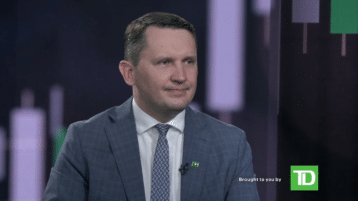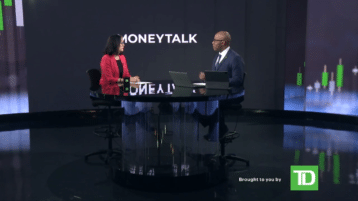The momentum behind the so-called Magnificent Seven have helped to drive markets into record territory. However, is that momentum at risk of slowing? Michael Craig, Managing Director and Head of Asset Allocation at TD Asset Management, discusses the outlook for tech stocks and the broader implications for markets.
Print Transcript
Markets have been tested recently by a pullback in some of the big US tech names. So are there signs out there of a bigger pullback on the horizon, or is this just a pause in this rally we've been seeing? Joining us now to discuss, Michael Craig, managing director and head of asset allocation at TD Asset Management. Michael, great to have you back on the show. And I realize the setup here is making you take out your crystal ball. We know you don't have one, but what's been going on in the markets?
You know, there's a bit of an exhaustion-- pretty aggressive rally to start the year. I think one key that there is some seasonals at play. US tax filing is in full flight. Last year was a great year for returns. People need to sell before April 15 to be able to use that money to pay off their tax bills. So there's a bit of a seasonality effect on top of just some, I think, overdone or overextended moves. So a little bit of profit-taking, 5% pullback. I don't think there's anything too serious here other than just the market kind of recharging, if you will, and getting set up probably for the next leg higher.
One of the narratives heading into this week is after the bouncy week we had-- bouncy-- sort of a rough week we had led by the tech stocks south of the border that we're going to start getting some tech earnings this week, and then, at some point, perhaps there will be some optimism in the actual fundamentals of the company. I mean, we've only had the big banks, a few health insurers south of the border-- we're sort of ramping up in Canada. What's your sense of the earnings season right now?
Yeah, I mean, I think the broadening in the market is probably a bit more of what we've been focusing on, so I don't really foresee any big drawdowns in tech. I know Tesla's had some challenges in terms of the Magnificent Seven. You don't buy tech for a quarterly release. It's more of an idiosyncratic growth story, if you will. So, I mean, now we sort of repriced a bit. AI is not going away. And so there's that.
But I think the bigger story for investors is that the rotation of the market has started to change, and you need to look past just technology. We've been focusing on industrials and energy this year, which have been nice places to work, and they've done well. And you haven't seen that sell-off like you have seen in the major tech industries, where there is, I think, a bit of an excessive amount of investor attention right now.
When you say industrials, you say energy, it makes me think cyclical plays that are based on a fairly strong economy. South of the border, the economy's been pretty well. Is that what this is about now, a belief that we're going to get a soft landing or just keep on trucking?
Well, keep on trucking for the time being. Manufacturing PMI indices have started to inflect and now working their way higher, so there is definitely a bit of a bid on the manufacturing side globally. Services actually is rolling over. And so again, very bizarre world post-COVID-- a lot of kind of industry cycles way out of sync. Manufacturing has been in kind of the basement for about 20 months now. And so I think that's where-- I think that's where we're interested in terms of that story evolving and being able to make some money there versus the services side, which has had a great run but is starting to soften.
On the big macro level, obviously, it's the Fed-- you knew I'd get to it at some point-- and this idea that it seems like it's been sort of like this story developing in increments over the year. You enter the year. Ah, there's going to be four, five, six cuts from the Fed, eh, maybe two or three, and then maybe none. I mean, this is a strangely evolving story. I'm looking at a US 10-year bond yield on my screen of 4.6%. Where are we sitting in terms of higher for longer?
So investor expectations of Fed policy has been incredibly inaccurate really since this hiking cycle started. And I only say that because whatever the narrative is today, it's unlikely that we're really talking about it in a few months' time. It's just we're trying to fit a narrative to the market.
Our own view is that the disinflationary process continues. It's not a straight line. Goods inflation is probably bottomed, but it's come off a long way. Leading indicators for services continue to point that rent's going to come off. There is going to be some sticky parts, but wages have definitely softened. So broadly speaking, things are on track. If we get cuts, nonrecessionary cuts, that will be very, very supportive for risk.
But the thought that we're going to have this reacceleration of inflation I really struggle with, particularly on the wages side. So I think people keep trying to fit the narrative, and also, I think, too, is important, is there's the Fed, and there's the Bank of Canada. And I think it's pretty likely we see some degree of divergence. We have a far more-- our economy is far more sensitive to interest rates than down south. And so yes, maybe the Fed only cuts once this year. But I would expect the bank to do-- the Bank of Canada to do quite a few more in the coming months.
There was a panel discussion just last week. Last week was such a busy week. I'm trying to remember everything that happened. But Tiff Macklem and Jerome Powell on the same panel. And when you talk about divergence, I mean, the headlines that were coming out of it-- you had Jerome Powell saying we're not seeing the progress on inflation that we had hoped for. And how about you, Mr. Macklem? Oh, things are looking pretty good in terms of where we're headed. And how much can the Bank of Canada diverge from the Fed at some point?
They'll follow our own inflation path, which has been softer. Employment in Canada has weakened materially. And remember, we still have massive immigration. So when you print zero jobs growth, or, if you look at the last six months, 80-plus percent of the jobs growth in the government sector on the back of a million-plus new people arriving here, that's a pretty dire job market in Canada right now. So I would expect to see that-- look, if the bank cuts and we see the currency really start to weaken, that'll probably be-- that will be the limiting factor.
But outside of-- and I think the BoC will be fine with the currency depreciates. They don't want to see a rapid depreciation. So if we see rapid depreciation, all bets are off. No more hikes. No more cuts. But I think, outside of that, I think we see a reasonable tightening cycle in Canada in the next 18 months.
What about geopolitical risk? Obviously, this has been in the headlines. People are trying to just gauge the sentiment, the level of tensions. Right now, it seems that the tensions are ratcheting down, but obviously a fluid situation.
So with that, I mean, it really requires a different type of thought process that market participants really haven't had to worry about in 30-plus years. I mean, it has been an era of pretty-- of not a lot of conflict. With the Middle East, I think it's been very much a show of force rather than anything more serious. So in terms of where we go from here, I would expect to see some things-- some cooler heads prevail.
But over the last 5 years, 10 years, the direction of travel has been far more severe. And we can't rule out conflict emerging between Israel and Iran. No one wants that-- certainly not the Americans, who would be pulled into it. And so I think this is, in many ways, it's really kind of geopolitical theater at its best.
On the Ukrainian-Russian side, Europe is beginning to rearm. The irony of that conflict is it is pulling the European Union closer because now they have a common enemy. And the irony is that the drifting of Europe over the years in terms of formulating coherent policy is this is probably going to supercharge that in the positive way.
It's unfortunate that you need a war to get people to go that way, but that I actually think this will probably be long-term supportive for Europe. And they're going to be much more focused on energy security, industrial policy, as well as coordination amongst other various economies. So I actually think, long-term, this is probably the catalyst required for Europe to compete, but at a horrible cost.
You put that all together, and it is a lot. What does it mean for asset allocation? What should investors be thinking about?
So our focus has been on the West plus Japan. So we like North America. We're, I would say, on the margin, less bearish Europe, and it's been a place to be underweight for a long time, and, I would say, intrigued by what's happening in Japan. Japan's going through, I think, one of those things you see once in a career in an economy. They have emerged from negative interest rates.
They are emerging from-- they're actually starting to see signs of inflation-- not rampant inflation, but inflation-- which is starting to break that disinflationary, deflationary mindset, which is so damaging to capitalist societies.
And you're seeing great improvements in corporate governance and an actual almost collapse of dependency ratios, the amount of-- the percent of the population over 50 is declining because people are passing, which is leading to an interesting demographics-- supportive demographics.
And they will be facing labor shortages, but that's going to increase productivity and investment in automation. So it's an intriguing-- with the Americans slowly trying to detach from China, Japan is well-positioned to pick up on that-- pick up on that. So increasing our allocations to Japan-- again, a place we haven't spent a lot of time on in some time.
[MUSIC PLAYING]
Markets have been tested recently by a pullback in some of the big US tech names. So are there signs out there of a bigger pullback on the horizon, or is this just a pause in this rally we've been seeing? Joining us now to discuss, Michael Craig, managing director and head of asset allocation at TD Asset Management. Michael, great to have you back on the show. And I realize the setup here is making you take out your crystal ball. We know you don't have one, but what's been going on in the markets?
You know, there's a bit of an exhaustion-- pretty aggressive rally to start the year. I think one key that there is some seasonals at play. US tax filing is in full flight. Last year was a great year for returns. People need to sell before April 15 to be able to use that money to pay off their tax bills. So there's a bit of a seasonality effect on top of just some, I think, overdone or overextended moves. So a little bit of profit-taking, 5% pullback. I don't think there's anything too serious here other than just the market kind of recharging, if you will, and getting set up probably for the next leg higher.
One of the narratives heading into this week is after the bouncy week we had-- bouncy-- sort of a rough week we had led by the tech stocks south of the border that we're going to start getting some tech earnings this week, and then, at some point, perhaps there will be some optimism in the actual fundamentals of the company. I mean, we've only had the big banks, a few health insurers south of the border-- we're sort of ramping up in Canada. What's your sense of the earnings season right now?
Yeah, I mean, I think the broadening in the market is probably a bit more of what we've been focusing on, so I don't really foresee any big drawdowns in tech. I know Tesla's had some challenges in terms of the Magnificent Seven. You don't buy tech for a quarterly release. It's more of an idiosyncratic growth story, if you will. So, I mean, now we sort of repriced a bit. AI is not going away. And so there's that.
But I think the bigger story for investors is that the rotation of the market has started to change, and you need to look past just technology. We've been focusing on industrials and energy this year, which have been nice places to work, and they've done well. And you haven't seen that sell-off like you have seen in the major tech industries, where there is, I think, a bit of an excessive amount of investor attention right now.
When you say industrials, you say energy, it makes me think cyclical plays that are based on a fairly strong economy. South of the border, the economy's been pretty well. Is that what this is about now, a belief that we're going to get a soft landing or just keep on trucking?
Well, keep on trucking for the time being. Manufacturing PMI indices have started to inflect and now working their way higher, so there is definitely a bit of a bid on the manufacturing side globally. Services actually is rolling over. And so again, very bizarre world post-COVID-- a lot of kind of industry cycles way out of sync. Manufacturing has been in kind of the basement for about 20 months now. And so I think that's where-- I think that's where we're interested in terms of that story evolving and being able to make some money there versus the services side, which has had a great run but is starting to soften.
On the big macro level, obviously, it's the Fed-- you knew I'd get to it at some point-- and this idea that it seems like it's been sort of like this story developing in increments over the year. You enter the year. Ah, there's going to be four, five, six cuts from the Fed, eh, maybe two or three, and then maybe none. I mean, this is a strangely evolving story. I'm looking at a US 10-year bond yield on my screen of 4.6%. Where are we sitting in terms of higher for longer?
So investor expectations of Fed policy has been incredibly inaccurate really since this hiking cycle started. And I only say that because whatever the narrative is today, it's unlikely that we're really talking about it in a few months' time. It's just we're trying to fit a narrative to the market.
Our own view is that the disinflationary process continues. It's not a straight line. Goods inflation is probably bottomed, but it's come off a long way. Leading indicators for services continue to point that rent's going to come off. There is going to be some sticky parts, but wages have definitely softened. So broadly speaking, things are on track. If we get cuts, nonrecessionary cuts, that will be very, very supportive for risk.
But the thought that we're going to have this reacceleration of inflation I really struggle with, particularly on the wages side. So I think people keep trying to fit the narrative, and also, I think, too, is important, is there's the Fed, and there's the Bank of Canada. And I think it's pretty likely we see some degree of divergence. We have a far more-- our economy is far more sensitive to interest rates than down south. And so yes, maybe the Fed only cuts once this year. But I would expect the bank to do-- the Bank of Canada to do quite a few more in the coming months.
There was a panel discussion just last week. Last week was such a busy week. I'm trying to remember everything that happened. But Tiff Macklem and Jerome Powell on the same panel. And when you talk about divergence, I mean, the headlines that were coming out of it-- you had Jerome Powell saying we're not seeing the progress on inflation that we had hoped for. And how about you, Mr. Macklem? Oh, things are looking pretty good in terms of where we're headed. And how much can the Bank of Canada diverge from the Fed at some point?
They'll follow our own inflation path, which has been softer. Employment in Canada has weakened materially. And remember, we still have massive immigration. So when you print zero jobs growth, or, if you look at the last six months, 80-plus percent of the jobs growth in the government sector on the back of a million-plus new people arriving here, that's a pretty dire job market in Canada right now. So I would expect to see that-- look, if the bank cuts and we see the currency really start to weaken, that'll probably be-- that will be the limiting factor.
But outside of-- and I think the BoC will be fine with the currency depreciates. They don't want to see a rapid depreciation. So if we see rapid depreciation, all bets are off. No more hikes. No more cuts. But I think, outside of that, I think we see a reasonable tightening cycle in Canada in the next 18 months.
What about geopolitical risk? Obviously, this has been in the headlines. People are trying to just gauge the sentiment, the level of tensions. Right now, it seems that the tensions are ratcheting down, but obviously a fluid situation.
So with that, I mean, it really requires a different type of thought process that market participants really haven't had to worry about in 30-plus years. I mean, it has been an era of pretty-- of not a lot of conflict. With the Middle East, I think it's been very much a show of force rather than anything more serious. So in terms of where we go from here, I would expect to see some things-- some cooler heads prevail.
But over the last 5 years, 10 years, the direction of travel has been far more severe. And we can't rule out conflict emerging between Israel and Iran. No one wants that-- certainly not the Americans, who would be pulled into it. And so I think this is, in many ways, it's really kind of geopolitical theater at its best.
On the Ukrainian-Russian side, Europe is beginning to rearm. The irony of that conflict is it is pulling the European Union closer because now they have a common enemy. And the irony is that the drifting of Europe over the years in terms of formulating coherent policy is this is probably going to supercharge that in the positive way.
It's unfortunate that you need a war to get people to go that way, but that I actually think this will probably be long-term supportive for Europe. And they're going to be much more focused on energy security, industrial policy, as well as coordination amongst other various economies. So I actually think, long-term, this is probably the catalyst required for Europe to compete, but at a horrible cost.
You put that all together, and it is a lot. What does it mean for asset allocation? What should investors be thinking about?
So our focus has been on the West plus Japan. So we like North America. We're, I would say, on the margin, less bearish Europe, and it's been a place to be underweight for a long time, and, I would say, intrigued by what's happening in Japan. Japan's going through, I think, one of those things you see once in a career in an economy. They have emerged from negative interest rates.
They are emerging from-- they're actually starting to see signs of inflation-- not rampant inflation, but inflation-- which is starting to break that disinflationary, deflationary mindset, which is so damaging to capitalist societies.
And you're seeing great improvements in corporate governance and an actual almost collapse of dependency ratios, the amount of-- the percent of the population over 50 is declining because people are passing, which is leading to an interesting demographics-- supportive demographics.
And they will be facing labor shortages, but that's going to increase productivity and investment in automation. So it's an intriguing-- with the Americans slowly trying to detach from China, Japan is well-positioned to pick up on that-- pick up on that. So increasing our allocations to Japan-- again, a place we haven't spent a lot of time on in some time.
[MUSIC PLAYING]



























